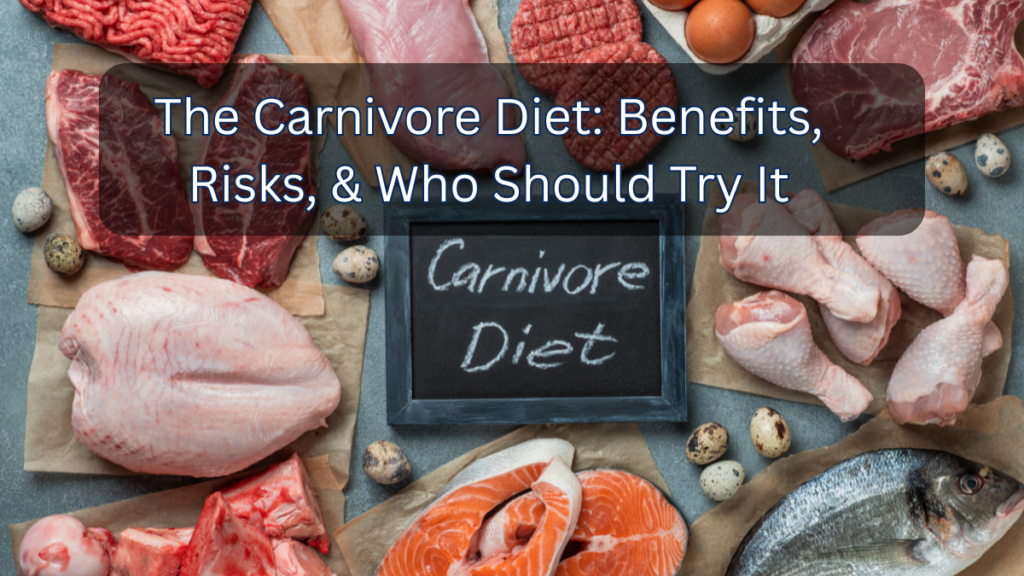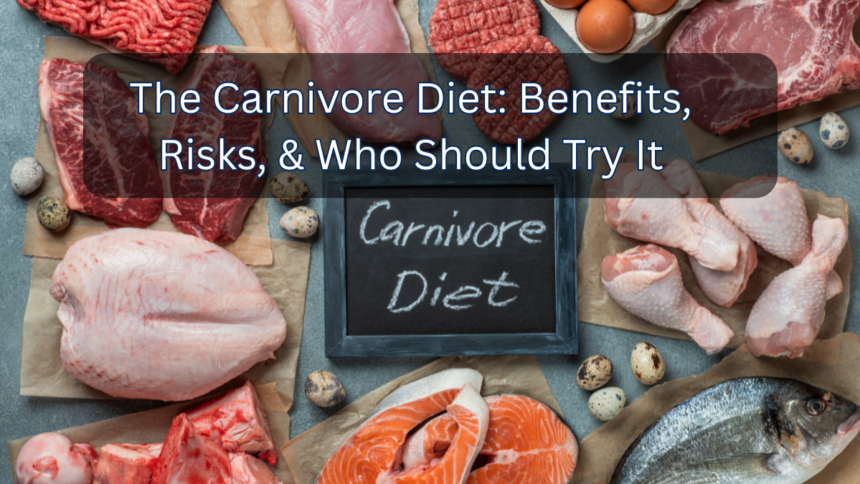Carnivore Diet
In a world of endless diet trends—keto, paleo, vegan, Mediterranean—the carnivore diet stands out as one of the most extreme. Imagine eating only meat, eggs, and maybe a little dairy—no fruits, no veggies, no grains. Sounds wild, right? Yet, advocates swear by its benefits, from weight loss to reduced inflammation.
But is an all-meat diet sustainable—or even safe? Who should try it, and who should steer clear? In this deep dive, we’ll explore the benefits, risks, and practical tips for navigating the carnivore diet.

What Is the Carnivore Diet?
The carnivore diet is exactly what it sounds like: a diet centered entirely on animal products. Think beef, chicken, fish, eggs, and limited dairy (if tolerated). There are no carbs, no fiber, and definitely no salads.
How It Works
- Eliminates all plant-based foods (no fruits, vegetables, grains, or legumes).
- Focuses on high-protein, high-fat foods (ribeye steak, bacon, salmon, eggs).
- May include some dairy (butter, cheese) if tolerated.
Proponents argue that humans evolved as meat-centric eaters and that modern diseases stem from processed foods and carbs. Critics, however, warn about potential nutrient deficiencies and long-term health risks.
Video Credits
Potential Benefits of the Carnivore Diet
1. Rapid Weight Loss
By cutting out carbs, the body enters ketosis (similar to the keto diet), burning fat for fuel. Many report quick fat loss and reduced cravings.
2. Reduced Inflammation
Some studies suggest that eliminating plant-based anti-nutrients (like lectins and oxalates) may lower inflammation, benefiting those with autoimmune conditions.
3. Simplified Digestion
For people with IBS, Crohn’s, or food sensitivities, removing fiber and plant irritants can lead to better digestion and fewer bloating issues.
4. Mental Clarity & Energy
High-fat diets support stable blood sugar, reducing energy crashes. Some followers report improved focus and reduced brain fog.
5. Potential Autoimmune Relief
Anecdotal evidence suggests that the carnivore diet may help manage rheumatoid arthritis, psoriasis, and other autoimmune disorders by removing inflammatory triggers.
Risks & Downsides of the Carnivore Diet
While some thrive on this diet, it’s not without controversy. Here are the biggest concerns:
1. Nutrient Deficiencies
No fruits or veggies means missing out on Vitamin C, fiber, and antioxidants. Long-term, this could lead to scurvy, constipation, or gut microbiome imbalances.
2. Heart Health Concerns
A diet high in saturated fats (like fatty cuts of meat) may raise LDL cholesterol, potentially increasing heart disease risk for some individuals.
3. Limited Long-Term Research
Most evidence is anecdotal or short-term. We don’t yet know the decades-long effects of an all-meat diet.
4. Social & Practical Challenges
Eating out? Family dinners? The carnivore diet can be socially isolating and hard to maintain in carb-heavy environments.
Who Should Try the Carnivore Diet?
This diet isn’t for everyone, but it might help certain people:
✅ Those with autoimmune conditions (if plant foods trigger symptoms).
✅ People struggling with obesity or metabolic issues (as a short-term reset).
✅ Individuals with severe food intolerances (like IBS or Crohn’s).
✅ Athletes or high-performers experimenting with metabolic flexibility.
Who Should Avoid It?
❌ People with kidney disease (high protein can strain kidneys).
❌ Those with a history of heart disease (due to saturated fat concerns).
❌ Pregnant or breastfeeding women (nutrient needs are higher).
❌ Anyone prone to disordered eating (extreme restriction can be risky).
Tips for Trying the Carnivore Diet Safely
If you’re curious, here’s how to minimize risks:
1. Start Slowly
Transition from keto or low-carb first to ease into ketosis.
2. Prioritize Quality Meat
Choose grass-fed beef, wild-caught fish, and pasture-raised eggs for better nutrients.
3. Monitor Your Health
Get blood work done (cholesterol, vitamins, kidney function) before and after.
4. Stay Hydrated & Add Electrolytes
No carbs means lower water retention—drink plenty of water and supplement sodium, potassium, and magnesium.
5. Listen to Your Body
If you feel fatigued, dizzy, or unwell, reintroduce carbs or consult a doctor.
Final Thoughts: Is the Carnivore Diet Worth It?
The carnivore diet is polarizing—some call it a miracle, others a fad. While it may offer short-term benefits (weight loss, reduced inflammation), the long-term risks remain unclear.
If you’re considering it, proceed with caution:
✔ Experiment short-term (30-90 days).
✔ Track your health markers.
✔ Don’t ignore warning signs.
Have you tried the carnivore diet? Share your experience in the comments! And if you found this guide helpful, subscribe for more nutrition deep dives.











